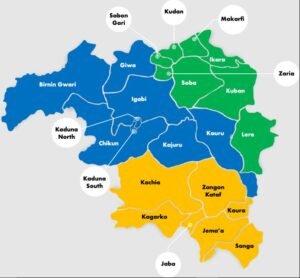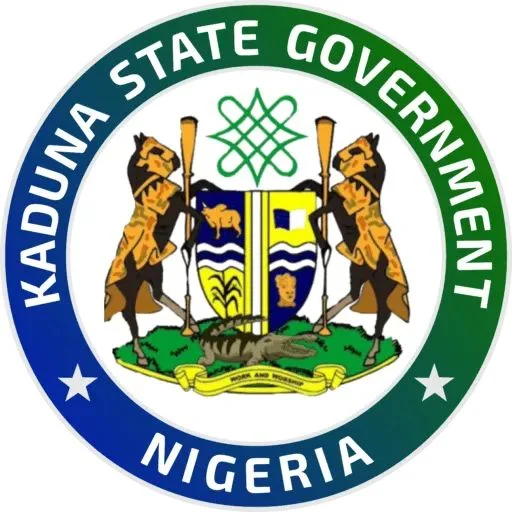This is the complete list of all the 23 local government areas In Kaduna State, Including their headquarters, and chairman names:
S/N | LGA | Headquarter | Chairman |
|---|---|---|---|
1 | Birnin Gwari | Birnin Gwari | Salisu Isah |
2 | Chikun | Chikun | Salasi Nuhu Musa |
3 | Giwa | Giwa | Hon. Abubakar Shehu Giwa |
4 | Igabi | Igabi | Sani Abdul |
5 | Ikara | Ikara | Bashir Mamman Dogon-Koli |
6 | Jaba | Kwoi | Larai Sylvia Ishaku |
7 | Jema'a | Kafanchan | Peter Tanko Dogara |
8 | Kachia | Kachia | Manzo Daniel Maigari |
9 | Kaduna North | Kaduna | Muhammad Gambo |
10 | Kaduna South | Kaduna | Rayyan Hussain |
11 | Kagarko | Kagarko | Muhuyiddeen Abdullahi Umar |
12 | Kajuru | Kajuru | Dauda Madaki |
13 | Kaura | Kaura | Sankyai Obadiah Sanko |
14 | Kauru | Kauru | Bashir Yanko Dawaki |
15 | Kubau | Kubau | Musa Saleh |
16 | Kudan | Kudan | Dauda Iliya Hunkuyi |
17 | Lere | Saminaka | Jafaru Ahmed |
18 | Makarfi | Makarfi | Muhammad Garba Sabon Gari |
19 | Sabon Gari | Sabon Gari | Muhammad Abubakar |
20 | Sanga | Gwantu | Anto Usman |
21 | Soba | Soba | Muhammad Lawal Shehu |
22 | Zangon Kataf | Zonkwa | Bege Gaiya Joseph |
23 | Zaria | Zaria | Jamil Ahmad Muhammad |
READ ALSO: Complete List Of LGAs In Zamfara State And Chairmen
Kaduna State LGA Map

What Is The Capital Of Kaduna State?
Kaduna is the capital city of Kaduna State and was historically the political capital of Northern Nigeria. Located on the banks of the Kaduna River, it succeeds as a bustling trade center and key transportation hub, enabling access to the northern states of Nigeria through its well-connected rail and road networks.
Originally populated by British colonists in 1900, Kaduna’s strategic location along the Lagos-Kano Railway prompted its selection as the administrative center of Nigeria’s former Northern Region in 1917.
Over time, it has retained its value, housing different political, military, and cultural institutions, particularly in Northern Nigeria.
Kaduna has a diverse economy, containing a list of industries such as textiles, machinery, steel, and agriculture. Despite facing challenges like unemployment, it remains resilient, with notable landmarks including the Kaduna Polo Club, Ahmadu Bello Stadium, and Kaduna Golf Club.
Under the administration of Governor Nasir el-Rufai, Kaduna has witnessed infrastructural upgrades, including the development of underpasses, flyovers, and streetlights, alongside establishing an inland dry port.
Its educational landscape is rich, hosting institutions like Kaduna State University, Nigerian Defence Academy, and Kaduna Polytechnic.
READ ALSO: Complete List Of LGAs In Lagos State And Their Chairmen
List Of LGA In Kaduna State And Their Population
Here are the Kaduna State local government areas, and their population:
| No | LGA | 2022 Population Projection |
|---|---|---|
| 1 | Birnin-Gwari | 382,000 |
| 2 | Chikun | 550,000 |
| 3 | Giwa | 432,000 |
| 4 | Igabi | 636,400 |
| 5 | Ikara | 287,700 |
| 6 | Jaba | 230,400 |
| 7 | Jema'a | 411,000 |
| 8 | Kachia | 373,100 |
| 9 | Kaduna North | 538,600 |
| 10 | Kaduna South | 595,000 |
| 11 | Kagarko | 353,200 |
| 12 | Kajuru | 162,200 |
| 13 | Kaura | 258,000 |
| 14 | Kauru | 326,900 |
| 15 | Kubau | 414,700 |
| 16 | Kudan | 205,300 |
| 17 | Lere | 501,900 |
| 18 | Makarfi | 216,600 |
| 19 | Sabon-Gari | 430,500 |
| 20 | Sanga | 223,800 |
| 21 | Soba | 430,200 |
| 22 | Zangon-Kataf | 471,300 |
| 23 | Zaria | 601,300 |
READ ALSO: Complete List Of LGAs In Oyo State And Chairmen
Which Is The Largest LGA In Kaduna?
Igabi is Kaduna State, Nigeria’s largest Local Government Area (LGA). Covering an expansive area of approximately 3,222 square kilometers, Igabi is home to a population estimated at 636,400 people.
Chaired by Executive Chairman Jabir Khamis, Igabi is one of the 774 local government areas in Nigeria. The history of Igabi dates back to its founding by a Qur’anic scholar from Borno state who settled near Rigachikun to teach Islamic studies.
Officially recognized as a district under the Zazzau Emirate in 1907 by the British colonial government, Igabi has grown into a powerful administrative entity.
Igabi’s demographic makeup is mostly Muslim, with exceptions like the Gbagyi people, who were traditionally non-Muslims but later embraced Christianity.
The LGA is divided into 12 wards, each contributing to its diverse community. Education plays an important role in Igabi, with primary, secondary, and tertiary institutions established within its borders.
Notable institutions include the Armed Forces Command and Staff College, Nigerian Tulip International College (formerly Nigerian Turkish), and the National Open University of Nigeria (NOUN).
The economy of Igabi succeeds primarily in agriculture, making it one of the state’s major contributors to the domestic product.
The production of maize and animal feed greatly impacts the region’s socio-economic growth, with an estimated total output of about $10 million.
Reference Sources:


Thank you very much. I found this information useful on the LGAs in kaduna state.
that is excellent
Wow i think kaduna is one of the populated state in nigeria